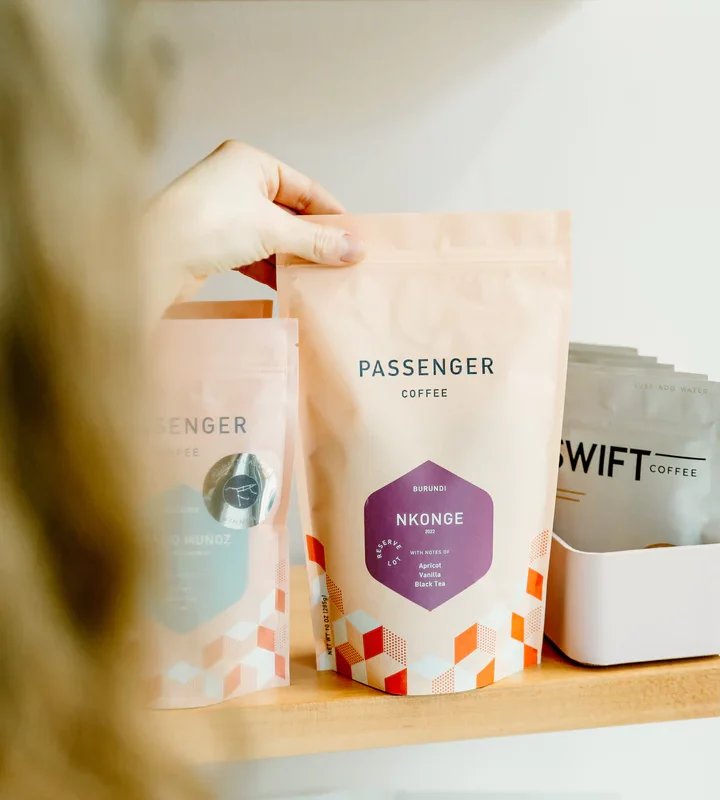
About this Coffee
As has been the case with many of our favorite Nkonge lots over the years, this 2022 harvest selection is notable for its impeccably balanced profile. Sweet pastry, cherry, and black tea aromatics introduce a cup offering flavors of apricot, rich baking spices, and vanilla wafer cookie.
Over 300 farming families contributed to this sweet, impressively balanced community lot from Nkonge hill, which was processed by the Long Miles team at Heza washing station. Passenger has proudly presented coffees produced by our Foundational Partners at the Long Miles Coffee Project for over six years running.
With a geographical area of less than 11,000 square miles, Burundi is a small, landlocked nation situated at the intersection of East Africa and the African Great Lakes region. Coffee production was forcibly introduced to the country in the 1920’s, after the German colonial territory of Ruanda-Urundi was allocated to Belgium by the League of Nations. Belgian colonial rule in those years mandated that every peasant farmer in the country cultivate at least fifty coffee trees. And while the Burundi coffee industry has navigated various seasons of privatization and nationalization since the country gained its independence in 1962, Burundian coffee continues to be produced by tiny, smallholder farmers who traditionally deliver the fruit of their coffee trees for sale and processing at one of ~140 washing stations that dot the country – many of which are owned by the state.
Founded by an American couple who moved to Burundi in 2011, the Long Miles Coffee Project has earned a strong reputation throughout the international specialty industry as an innovative, farmer-driven producer of top quality Burundian coffees. Noting that coffee farmers in Burundi stood to benefit from improved access to the specialty market and that specialty roasters struggled to source traceable coffees of consistent quality in Burundi, Ben and Kristy Carlson perceived an opportunity to make a positive impact on both fronts. Following the construction of the first Long Miles washing station, Bukeye, in 2013, the team has opened two additional processing sites (Heza and Ninga) in more recent years. Each Long Miles washing station is strategically located in close proximity to thousands of rural coffee farmers who are members of distinct hill communities (the smallest geopolitical unit in Burundi is the colline or “hill”). During the harvest season, each microlot produced by the Long Miles team is kept separated and traceable to the specific hill where it was harvested. For example, all microlots processed at Heza are named after one of the five hills that deliver to the washing station during harvest: Nkonge, Mikuba, Gitwe, Gishubi, and Mutana.
Passenger is proud to count the Long Miles Coffee Project, and the communities of Burundian coffee farmers that they work closely with, as one of six Foundational Partnerships that form the heart of our sourcing program. For each of these producer partnerships, our goal is the same: to buy as significant a volume as we can each year on an ongoing basis, intentionally prioritizing the purchase of a broad spectrum of available quality grades. Since 2018, Passenger’s primary menu offering from Burundi has been the Heza Foundational lot [link], named for the Long Miles washing station where the majority of our annual selections are processed.
This particular wet processed microlot is composed of coffee from the 2022 harvest on Nkonge hill. At 2000-2200 meters above sea level, Nkonge is one of the highest elevation collines that deliver to Heza – resulting in slow cherry maturation that tends to benefit cup quality. While Passenger’s green buying team has selected coffees from all the Heza hills in past years – many of our all-time favorites have come from Nkonge.
Here are the basic steps of the Long Miles team’s typical approach to wet processing at Heza:
- During the harvest season, handpicked coffee “cherries” are delivered to one of the Long Miles washing stations by local farmers.
- The cherries are checked/sorted for consistent ripeness and individual farmer deliveries are received, weighed, and recorded by the Long Miles team to ensure lot traceability and calculate farmer payment.
- Coffee cherries are then passed through a McKinnon disc pulping machine to remove the fruit from the seeds.
- Freshly pulped coffee seeds are fermented in open air tanks filled with clean water (i.e. “wet fermentation”). The reason for the fermentation stage is to help remove the sticky, sugary layer of mucilage that remains on the surface of the coffee seed after the fruit has been removed by the pulping machine. Yeasts and bacteria in the air, on the fruit, and in the water play a key role in breaking down the sugars in the coffee’s mucilage.
- After 12-18 hours of wet fermentation, the coffee is washed in grading channels (removing defective seeds and sorting by density) at which point the mucilage has been completely cleaned away and a handful of formerly sticky coffee seeds feel smooth to the touch, like river pebbles.
- At this stage, the coffee undergoes a post-fermentation soak in clean water, usually for 8-10 hours.
- Following the soak, the beautifully processed coffee “parchment” is spread out on raised beds and carefully dried in the sun until the coffee reaches its target moisture content. Drying is usually completed in approximately 30 days.
Thanks to Passenger’s practice of preserving our green coffee inventory in an off-site freezer facility, we are able to curate our menu with an archival (rather than strictly seasonal) focus. At the time of writing, we are excited to add this beautiful 2022 Nkonge harvest selection to the Reserve Lot menu – creating a unique opportunity to taste it alongside a pristine Heza Foundational selection (also from Nkonge hill!) from the previous year’s harvest.